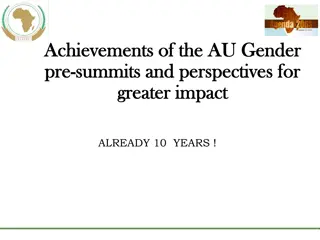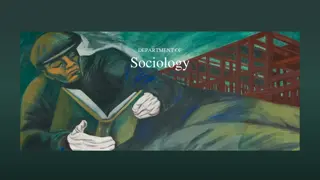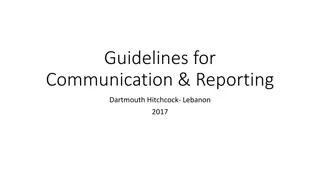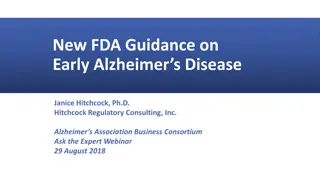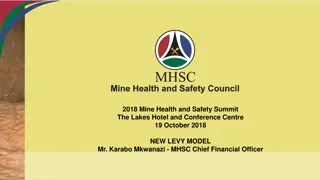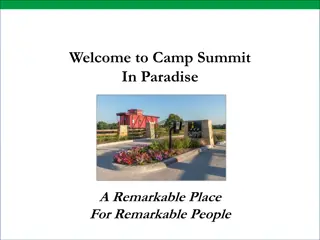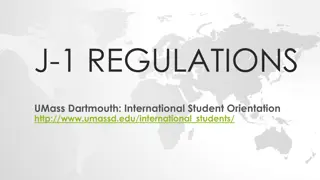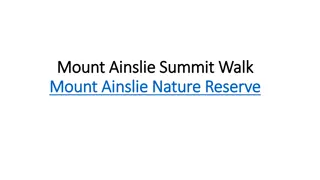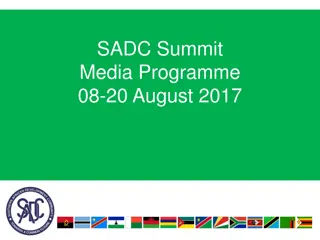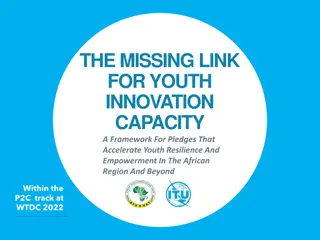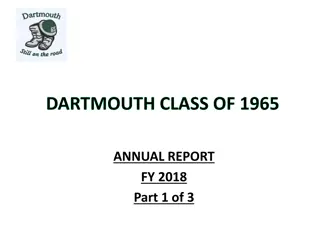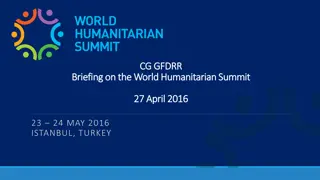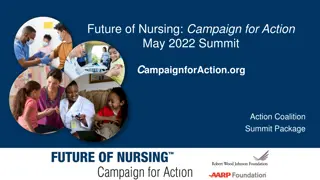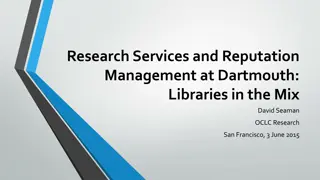Dartmouth-Hitchcock Youth Summit: Empowering Youth Through Knowledge and Understanding
The Dartmouth-Hitchcock Youth Summit empowered 350 students from 65 school districts through discussions on various topics led by youth and experts. The event focused on life balance challenges, social media for good, and a film & writing festival. Insights were shared on substance use issues, emphasizing the need for education, support, and a health-centered approach. The summit also addressed mental health challenges such as suicide, self-harm, and depression, highlighting the importance of breaking the stigma and promoting open dialogue.
Download Presentation

Please find below an Image/Link to download the presentation.
The content on the website is provided AS IS for your information and personal use only. It may not be sold, licensed, or shared on other websites without obtaining consent from the author.If you encounter any issues during the download, it is possible that the publisher has removed the file from their server.
You are allowed to download the files provided on this website for personal or commercial use, subject to the condition that they are used lawfully. All files are the property of their respective owners.
The content on the website is provided AS IS for your information and personal use only. It may not be sold, licensed, or shared on other websites without obtaining consent from the author.
E N D
Presentation Transcript
Day 1: For Youth, Led by Youth Knowledge, Empowerment, Understanding 350 Students from 65 School Districts Morning: 9 topical discussions Each student attended 3 discussion groups Approximately 120 in each group, divided into sub-groups of 40 Each group had 3 student facilitators, 3 content experts (educator, psychology, health care), and 6 scribes per group Lunch: report outs and discussion Afternoon: Life Balance Challenges: Hannah Kearney, Olympic Gold skier from the Upper Valley Social Media for Good: Seattle Mama Doc, Wendy Sue Swanson, Pediatrician Film & Writing Festival: 50 submissions: 5 top videos, 4 top stories highlighted Will be posted on NH Children s Behavioral Health Collaborative: http://www.nh4youth.org/
Day 2: For Educators, Parents, Community They re Talking. Are We Listening? Approximately 150 attendees Report-out and discussion panels (students, content experts, audience) Mental Health Diversity Timely Topics Social Media Community engagement Researcher-Community Collaboration: Teen Speak Out Public Health Networks as rich resources Health care community collaborations
What We Heard: Experiences & Opportunities Anyone who harbors doubts about the younger generation or the future of civil discourse, for that matter should have gone to the Dartmouth-Hitchcock Youth Summit last Friday. Shawne Wickham Manchester Union Leader, April 8, 2019 At right: Quincy Roy from Manchester Memorial High School leads a discussion at the Dartmouth-Hitchcock Youth Summit.
Substance Use Experience Wide spread use: cope and escape, peer pressure, parental use Vaping use huge, also use of marijuana, pills, alcohol Kids are using at school without detection Sense that there is an emphasis on punishment rather than providing help Hopes Need education on the science of substances and health Treat like a health issue so kids can come forward Peer educators and support balanced with expert information Concern with out of school suspension for kids who need help More access to counseling to get at the root of the problem
Suicide, Self Harm & Depression Experience Many people hurting Mental health stigma keeps people from speaking up Many feel abnormal coping with the range of human feelings Social media can isolate and distort perceptions of others Feel school counselors not available, too busy, need to schedule Hopes Opportunities to discuss feelings Education on mental health issues and signs of suicide risk Trained peer counselors (e.g. NAMI program) Access to counseling in school on an as needed basis Fact: 9 out of 10 people who survive a suicide attempt are glad they survived. 9 out of 10 people who attempt suicide with a gun die. Remove from homes when depression or instability present.
Eating Disorders Experience Pressure to look a certain way: bulk up or slim down for certain sports, be curvier or skinnier, taller or smaller, etc. all amplified by media Body image distortions are common Affects males as well as females Focus on spectrum of eating beliefs, dieting, and challenges not just specific eating disorders; there is a need for information Little understanding, hard to recognize in friends and respond Hopes Celebration of different body types; healthy comes in different shapes More education on healthy eating, on signs of a problem, intervention Self acceptance
Race & Ethnicity Experience Limited diversity in NH, few teachers of color or diverse ethnicity Awkward to discuss, want to better understand the issues Racism and racist remarks prevalent, even among well-meaning Hear Micro-aggressions several times a day followed by, It s just a joke Hear N word daily History taught as white person s history People feel at risk if they question teachers attitudes Hopes Greater respect, understanding that language can hurt Readings by diverse authors, more balanced history, more diverse role models in schools Celebrations of diverse cultures: such as food, cultural days
Gender & Sexuality Experience LGBTQIA students still experience stigma and discrimination Language and jokes reflect homophobia and transgender fears Increasingly understand gender and sexuality as a continuum Harassment and assumptions are common Hopes Need education at younger ages, supports for experience Peer support: GSA, DSA, Prom Out Safe spaces and people, E.g. wristbands as sign of safety Gender neutral bathrooms
Bullying Experience Bullies as traumatized individuals in need of help Target marginalized people: race, gender, ethnicity, disabled, etc. Social media has extended reach, home no longer is a haven Noted that schools with better support resources have less bullying Hopes Nee for upstanders not bystanders Need for respect and recognize common humanity Need for better psychosocial support services
Pressure for Success Experience Definition of success differs for everyone: money, career, healthy life, relationships; accepting others values and different goals reduces judgment Stress sources differ: siblings, friends, school expectations, parents, self Learn in different ways: hands on, lectures, interactive Can t do everything well Hopes Diverse learning options, schedules, methods Mental health services Learn coping skills Self acceptance
School Violence Experience Many feel unsafe in school, impairs attention, heightens anxiety Diverse types of violence: bullying, fights, gangs, threat of gun violence People who are bullied end up threatening others Mixed impact of social media: document violence, but may encourage Hopes Realistic drills and training for crises Treatment for people with anger, aggression, other mental health issues More connections and respect for all students, buddy system Greater responsibility to report concerns
Road Trip: Distracted Driving Experience Diverse distractions: passengers, texting, calls, substance use Parents not always best roles models Kids think things won t happen to them, feel invulnerable Hopes Emphasize responsibility and consequences of actions for others Reduce social stigma of objecting to risky behavior Speak up, exit car Find new friends if they don t change their behaviors Strategies for help Text code a word to get away from a situation
Consistent Themes Heard Throughout Health education on diverse topics. Realistic, non-directive Mental health, gender and sexuality, substances, interactions/bullying, nutrition, other Access to health information, assessment of care at school as needed: physical, mental, social SAPs, co-located health clinics, other Opportunities for meaningful, authentic discussions with others Trained peer supports





